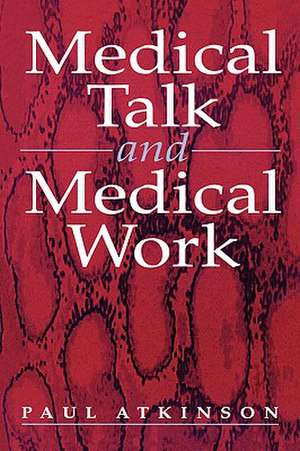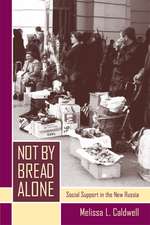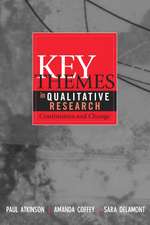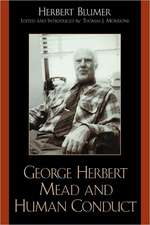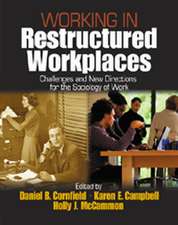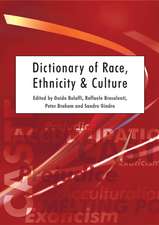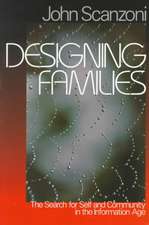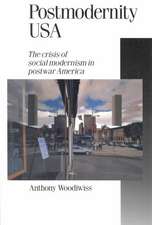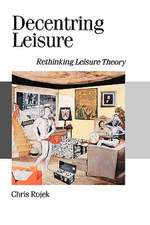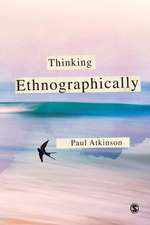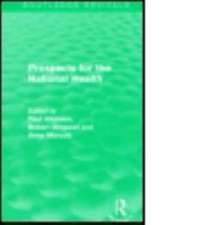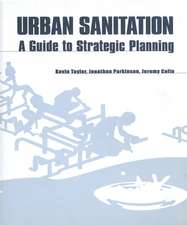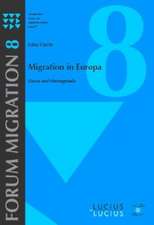Medical Talk and Medical Work
Autor Paul Atkinsonen Limba Engleză Paperback – 14 iun 1995
Underlying the analysis is research on the work of haematologists, which offers a rich resource for understanding the complexities and contradictions between physical bodies and social embodiment, medical talk and technical apparatus. Using but moving beyond this specific material, Paul Atkinson demonstrates the strengths and weaknesses of the existing understanding of medical knowledge. Among the issues explored are: the place of interaction among doctors, rather than between doctors and patients, in defining the construction of medical knowledge; the ways in which clinical opinion is socially produced and the nature of the local settings through which this process occurs; and the relations among medical knowledge, medical language and the increasingly technological contexts of contemporary medical practice.
| Toate formatele și edițiile | Preț | Express |
|---|---|---|
| Paperback (1) | 460.86 lei 6-8 săpt. | |
| SAGE Publications – 14 iun 1995 | 460.86 lei 6-8 săpt. | |
| Hardback (1) | 1542.49 lei 6-8 săpt. | |
| SAGE Publications – 14 iun 1995 | 1542.49 lei 6-8 săpt. |
Preț: 460.86 lei
Preț vechi: 542.19 lei
-15% Nou
Puncte Express: 691
Preț estimativ în valută:
88.18€ • 92.32$ • 72.97£
88.18€ • 92.32$ • 72.97£
Carte tipărită la comandă
Livrare economică 05-19 aprilie
Preluare comenzi: 021 569.72.76
Specificații
ISBN-13: 9780803977310
ISBN-10: 080397731X
Pagini: 176
Dimensiuni: 156 x 234 x 13 mm
Greutate: 0.29 kg
Ediția:1
Editura: SAGE Publications
Colecția Sage Publications Ltd
Locul publicării:London, United Kingdom
ISBN-10: 080397731X
Pagini: 176
Dimensiuni: 156 x 234 x 13 mm
Greutate: 0.29 kg
Ediția:1
Editura: SAGE Publications
Colecția Sage Publications Ltd
Locul publicării:London, United Kingdom
Recenzii
`Makes liberal use of transcripts of conversational language and writes in an engaging style. The contemporary significance of this book makes it an attractive acquisition' - Choice
`Paul Atkinson's work on the discourses of medicine and medical knowledge is well- known. In his latest book he extends it with a detailed ethnographic exploration of how one particular group of doctors - haematologists - reason, discuss, create and judge the evidence concerning their patients' disorders, treatments and progress.... This is a difficult and challenging book, but this may be no bad thing if it helps us to see that discourse and communication are infinitely more complex and multifaceted than the plethora of facile nursing textbooks on communication skills would have us believe' - Nursing Times
`It is said that publishers are increasingly reluctant to publish monographs. However, after several months fieldwork in US and British hospital haematology departments, Paul Atkinson has produced a work of greater breadth and significance than the usual monograph.... Atkinson convincingly demonstrates that medical decision-making is not limited to the consulting room.... In my view, Atkinson also rightly offers a counterbalance to the tendency to treat research interviews as our primary source of data, for instance in studies of lay perceptions of illness.... [the book's] central achievement is to shake up our sub-discipline in a consistently intelligent way. As such, it is essential reading' - David Silverman, Sociology of Health & Illness
`As Paul Atkinson argues, medical sociology has unnecessarily limited its focus to talk between doctor and patient. By so doing, it has lost sight of medical work as an intra-professional activity, moving between the case conference, the lecture theatre and the laboratory. Treating respected dichotomies (eg `medicine/the lifeworld', the `natural'/the `social') as topic rather than resource, Atkinson's sensitive ethnography gives us a fascinating insight into the local construction of medical `cases' and the reproduction of medical knowledge. This accessible, compelling book should be essential reading for medical sociologists, ethnographers and sociologists of scientific knowledge' - Professor David Silverman, Goldsmiths College, University of London
`Medical talk and Medical Work is both an essential and challenging text that advances new theoretical orientations and methodologies in the study of the sociology of medicine as it pertains to doctor-doctor communication. Using as his primary data ethnographic fieldwork conducted among hematologists in the U.S. and Britain, Atkinson reveals how doctors work to produce and reproduce medical knowledge about patients and their conditions through medical discourse and the narrative construction of medical cases' - DSQ
`Paul Atkinson's work on the discourses of medicine and medical knowledge is well- known. In his latest book he extends it with a detailed ethnographic exploration of how one particular group of doctors - haematologists - reason, discuss, create and judge the evidence concerning their patients' disorders, treatments and progress.... This is a difficult and challenging book, but this may be no bad thing if it helps us to see that discourse and communication are infinitely more complex and multifaceted than the plethora of facile nursing textbooks on communication skills would have us believe' - Nursing Times
`It is said that publishers are increasingly reluctant to publish monographs. However, after several months fieldwork in US and British hospital haematology departments, Paul Atkinson has produced a work of greater breadth and significance than the usual monograph.... Atkinson convincingly demonstrates that medical decision-making is not limited to the consulting room.... In my view, Atkinson also rightly offers a counterbalance to the tendency to treat research interviews as our primary source of data, for instance in studies of lay perceptions of illness.... [the book's] central achievement is to shake up our sub-discipline in a consistently intelligent way. As such, it is essential reading' - David Silverman, Sociology of Health & Illness
`As Paul Atkinson argues, medical sociology has unnecessarily limited its focus to talk between doctor and patient. By so doing, it has lost sight of medical work as an intra-professional activity, moving between the case conference, the lecture theatre and the laboratory. Treating respected dichotomies (eg `medicine/the lifeworld', the `natural'/the `social') as topic rather than resource, Atkinson's sensitive ethnography gives us a fascinating insight into the local construction of medical `cases' and the reproduction of medical knowledge. This accessible, compelling book should be essential reading for medical sociologists, ethnographers and sociologists of scientific knowledge' - Professor David Silverman, Goldsmiths College, University of London
`Medical talk and Medical Work is both an essential and challenging text that advances new theoretical orientations and methodologies in the study of the sociology of medicine as it pertains to doctor-doctor communication. Using as his primary data ethnographic fieldwork conducted among hematologists in the U.S. and Britain, Atkinson reveals how doctors work to produce and reproduce medical knowledge about patients and their conditions through medical discourse and the narrative construction of medical cases' - DSQ
Cuprins
Introduction
Work among the Haematologists
The Sociological Construction of Medicine
The Production of Medical Knowledge
Reading the Body
Constructing Cases
Voicing Opinion
Voices of Medicine
Conclusion
Work among the Haematologists
The Sociological Construction of Medicine
The Production of Medical Knowledge
Reading the Body
Constructing Cases
Voicing Opinion
Voices of Medicine
Conclusion
Notă biografică
Descriere
The development of a sociology of medical knowledge is both assessed and contributed to in Medical Talk and Medical Work.
Underlying the analysis is research on the work of haematologists, which offers a rich resource for understanding the complexities and contradictions between physical bodies and social embodiment, medical talk and technical apparatus. Using but moving beyond this specific material, Paul Atkinson demonstrates the strengths and weaknesses of the existing understanding of medical knowledge. Among the issues explored are: the place of interaction among doctors, rather than between doctors and patients, in defining the construction of medical knowledge; the ways in which clinical opinion is socially pr
Underlying the analysis is research on the work of haematologists, which offers a rich resource for understanding the complexities and contradictions between physical bodies and social embodiment, medical talk and technical apparatus. Using but moving beyond this specific material, Paul Atkinson demonstrates the strengths and weaknesses of the existing understanding of medical knowledge. Among the issues explored are: the place of interaction among doctors, rather than between doctors and patients, in defining the construction of medical knowledge; the ways in which clinical opinion is socially pr
